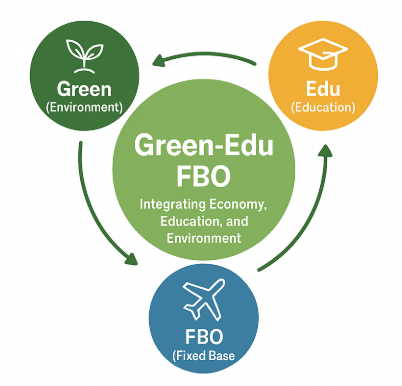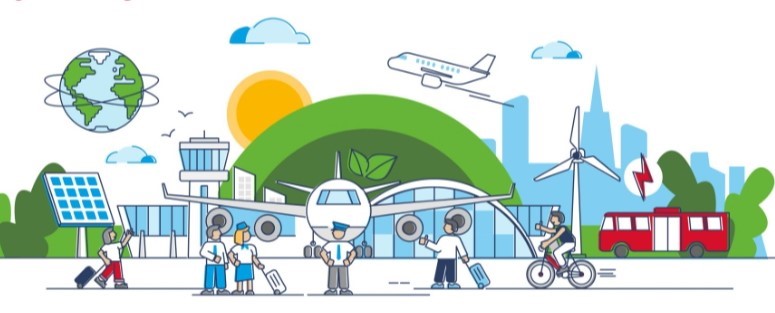This article explores the concept of a Green-Edu Fixed Base Operation (FBO) as a comprehensive model for strengthening sustainable general aviation (GA) in Indonesia. By integrating business, education, and environmental functions, the Green-Edu FBO can serve as a living laboratory for the transition toward green aviation, aligned with the global CORSIA and Airport Carbon Accreditation (ACA) programs. By adopting best practices from the United States, Canada, and Australia, Indonesia can build adaptive infrastructure, develop qualified human resources, and formulate responsive policies to the growing trend of sustainable aviation—while unlocking new economic value in secondary airports and national training hubs.
Revisiting Indonesia’s General Aviation Potential
National aviation policy in Indonesia has long focused on scheduled airlines and large commercial networks. Yet, beyond the commercial sector lies the world of general aviation (GA)—non-scheduled and non-commercial flying activities including pilot schools, air taxis, aerial surveys, medical evacuation, and recreational flights.
In advanced economies, GA serves as the foundation for developing aviation human capital and technological innovation. Indonesia, with its vast geography and growing demand, holds great potential in this sector. However, it still faces chronic challenges: limited infrastructure, high operational costs, and the absence of an integrated business model that combines education, research, and operational services.
The Green-Edu FBO concept is designed to close these gaps.
Understanding the FBO: From History to Strategic Meaning
Traditionally, a Fixed Base Operation (FBO) is an airport-based entity that provides a range of services for non-commercial aviation—such as fuelling, light maintenance, flight briefing, and passenger handling for business aviation.
In the United States, over 3,000 FBOs form the backbone of general aviation. Canada and Australia have similarly developed FBOs as aviation hubs supporting technical training and small operators.
Indonesia, by contrast, lacks a mature FBO framework. GA services are scattered across multiple airports without an integrated system, even as demand for pilot training and specialized flight operations continues to rise. A Green-Edu FBO could become the catalyst for renewal, connecting the dots between business, education, and sustainability.
Green-Edu FBO: Integrating Economy, Education, and Environment
The Green-Edu FBO is built upon three strategic pillars:
Green (Environment): Adoption of renewable energy, electric ground handling equipment, and low-carbon fuels such as Sustainable Aviation Fuel (SAF).
Edu (Education): Establishment of a training and research centre for pilots, engineers, and aviation students.
FBO (Fixed Base Operation): Provision of professional GA services—fuelling, maintenance, and VIP handling—in an efficient and environmentally responsible manner.
Together, these pillars form a business ecosystem that delivers economic, social, and environmental value simultaneously.

The Business Process of a Green-Edu FBO
The Green-Edu FBO operates through an integrated service chain:
Aircraft Operations & Ground Handling: Coordinating arrivals and departures, apron parking, and light maintenance using low-emission electric equipment.
Maintenance and Inspection: Energy-managed hangars serving as both technical training centres (AMTO) and laboratories for energy efficiency.
Fuelling and SAF Integration: A fuel farm that supplies bioavtur and operates an SAF blending unit—also used as a research facility for green fuels.
Education and Research Centre: Classrooms, simulation rooms, and green laboratories for training in green operations, emission calculations, and aviation management.
Community & Innovation Hub: Acting as an incubator for aviation startups and a public education space for carbon awareness and decarbonization.
Sustainability Reporting & Carbon Monitoring: All energy and emission data are monitored through a digital Monitoring–Reporting–Verification (MRV) system, forming the basis for sustainability reporting and carbon certification.
Hence, the Green-Edu FBO is not merely a service facility—it is a learning ecosystem for green aviation innovation.
Key Infrastructure Requirements
To operate effectively, a Green-Edu FBO requires several essential infrastructure components:
Green Terminal: Energy-efficient design with solar panels, water recycling systems, and eco-lounges.
Multifunction Hangar: Natural ventilation and lighting, energy-efficient maintenance areas.
Green Apron & Fuel Depot: Electric charging points, bioavtur blending facilities, and waste management systems.
Digital Operations Center: A control hub for flight, energy, and carbon MRV systems.
Edu-Tech Campus: Simulation rooms, green fuel laboratories, and startup research corners.
Community Zone: Aviation-themed parks and educational cafés for public engagement.
Secondary airports such as Banyuwangi, Budiarto, Palangkaraya, and Lombok are ideal candidates for pilot projects of this kind.
Learning from International Best Practices
United States: FBOs such as Signature Flight Support and Atlantic Aviation have implemented SAF use, waste recycling systems, and electric vehicle fleets.
Canada: Skyservice FBO integrates technical training with sustainability reporting and green operations.
Australia: FBOs in Perth and Melbourne serve as aviation education hubs, partnering with local universities for clean energy research.
Indonesia can draw lessons from these examples by promoting collaboration among FBOs, universities, and airport authorities.
Relevance of CORSIA and Airport Carbon Accreditation (ACA)
CORSIA as the Sky Bridge: The Carbon Offsetting and Reduction Scheme for International Aviation (CORSIA) established by ICAO mandates MRV-based mechanisms and carbon offsetting for international flights. Local FBOs could adopt similar frameworks for ground operations—measuring, monitoring, and reporting emissions as part of Indonesia’s national decarbonization strategy.
ACA as the Ground Framework: The Airport Carbon Accreditation (ACA) by Airports Council International (ACI) evaluates airport carbon management across four levels: Mapping, Reduction, Optimization, and Neutrality. Green-Edu FBOs can follow these principles to manage energy use, replace conventional GSE with electric units, and design educational carbon offset projects.
Integrating both systems—CORSIA for the skies and ACA for the ground—positions the FBO at the nexus of air and earth, transforming it into a comprehensive decarbonization lab where Indonesian aviation personnel can learn to apply global sustainability standards in real-life settings.
Valuation and Monetization of the Green-Edu FBO
The monetization of the Green-Edu FBO concept can be approached through a value-based ecosystem model, where its economic worth is derived not only from operational services but also from measurable contributions to decarbonization, education, and clean-energy innovation. Value creation emerges from the integration of three core dimensions—green operations, edu-lab innovation, and carbon economy—which can then be transformed into sustainable revenue streams.
From a valuation standpoint, the Green-Edu FBO holds the potential to generate a green premium value, representing an appreciation in asset worth due to its low-carbon and renewable-energy design. Facilities such as solar-powered hangars, electric ground support equipment (e-GSE), and Sustainable Aviation Fuel (SAF) blending stations can be categorized as green infrastructure assets. These assets carry higher market valuations and qualify for green financing or ESG-linked loans from global financial institutions. This valuation can be further enhanced through a carbon offset credit system, whereby every ton of CO₂ mitigated through efficient FBO operations can be converted into carbon credits tradable in both domestic and international carbon markets.
In terms of revenue generation, the Green-Edu FBO unlocks diverse monetization channels. First, through green aviation services—including sustainable fuel supply, electric aircraft handling, and energy-as-a-service solutions for aviation tenants seeking clean energy adoption. Second, through education and training, by establishing a Green Aviation Academy offering professional programs in sustainable flight operations, carbon management, and green maintenance engineering. These programs could be accredited under ICAO’s TRAINAIR Plus system or equivalent global bodies, expanding the international reach of the education business line.
Third, monetization can arise from research and innovation, particularly through the commercialization of intellectual property (IP) and technology licensing stemming from university–industry collaborations—such as waste-to-fuel conversion or AI-based flight efficiency analytics. Fourth, by developing a digital twin and data analytics center, the FBO can generate data-as-a-service (DaaS) revenue by providing actionable emissions and performance data for airport operators and local governments.
Moreover, positioning the Green-Edu FBO as a regional green economy hub opens pathways to develop green economic clusters, integrating aviation with energy, education, and technology sectors. The FBO thus evolves beyond a service provider into an investment and carbon-trading platform, reinforcing its identity as an impact-driven business where financial profit aligns with national sustainability targets (SDGs and Net Zero Emission 2060).
By combining carbon assets, intellectual capital, and green operational efficiency in its valuation model, the Green-Edu FBO represents not only a financially profitable enterprise but also a strategic showcase of Indonesia’s commitment to pioneering sustainable aviation ecosystems in Southeast Asia.
Strategic Benefits
Economic: Generates new revenue streams from fuelling, training, and carbon services.
Human Resources: Cultivates aviation professionals skilled in sustainability and green technologies.
Environmental: Fosters a low-emission operational culture in the aviation ecosystem.
Challenges and Mitigation Strategies
Regulatory: Legal recognition is needed for FBOs with educational and sustainability functions.
Financing: Development can be supported through Public–Private Partnerships and green financing schemes.
Human Resources: Strengthened collaboration with universities and aviation training centres.
Coordination: Synergy among FBOs, Airport Authorities, and national regulators is crucial.
A Reflection for the Future
The Green-Edu FBO could become a new symbol of Indonesia’s aviation identity—innovative, inclusive, and sustainable.
Beyond supporting general aviation, it strengthens Indonesia’s diplomatic standing within ICAO and ACI as a pioneer of green training and operational hubs in Southeast Asia.
Conclusion
Aviation is not only about aircraft that take to the skies, but also about how wisely we prepare the ground that supports them.
The Green-Edu FBO represents a small step with a profound meaning—a space where business, education, and the environment converge to nurture a generation of aviators who not only fly high but also think green.
References
Airports Council International (2024). Airport Carbon Accreditation Annual Report. Geneva: ACI World.
FAA (2022). General Aviation and Part 135 Activity Survey. Washington D.C.: FAA.
ICAO. Aviation Environmental Protection Report (2022).
ICAO. Long-Term Aspirational Goal, Assembly 41 (2022).
ICAO. CORSIA Implementation Elements (2021–2024).
IPCC. Aviation and the Global Atmosphere (2021–2023).

